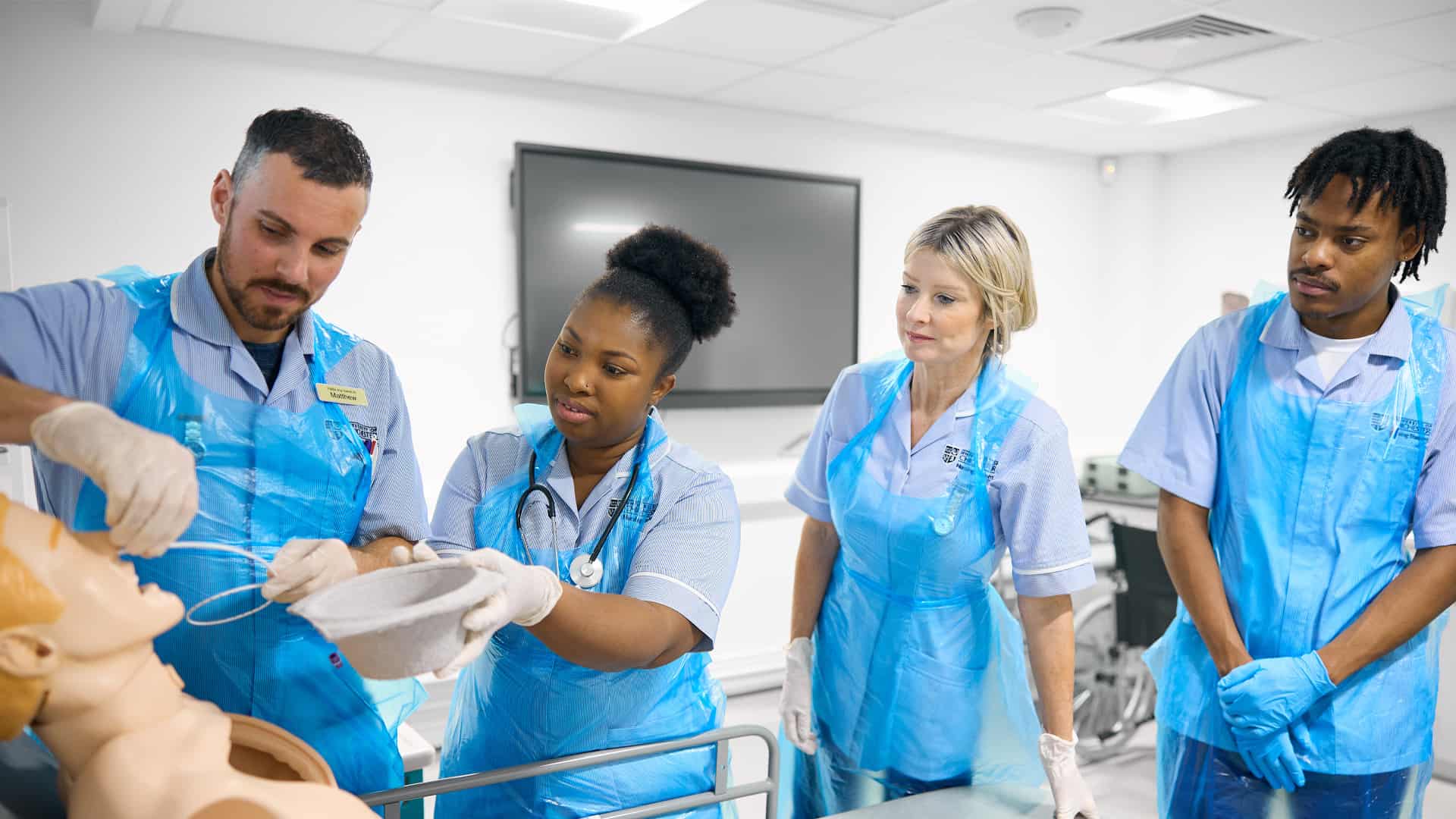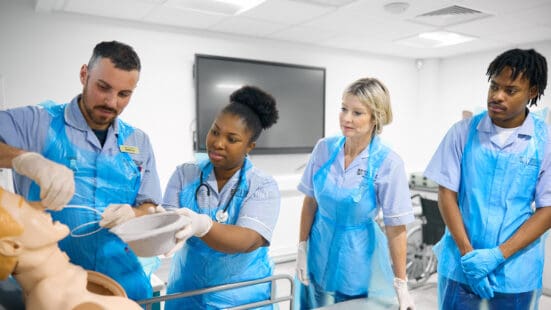Information for Nursing Associate Employers
Find everything you need to know about Nursing Associate apprenticeships, including:
- What is a Nursing Associate?
- What are the benefits of hiring a Nursing Associate?
- How do Nursing Associate apprenticeships work?
- How do the finances work?
- What does the University of Chichester offer?

Available to existing employees or new recruits, apprenticeships allow you to develop and retain talent within your workforce.
What is a Nursing Associate?
- The Nursing Associate is a new role that is regulated in England by the Nursing and Midwifery Council (NMC), the body responsible for regulating the nursing and midwifery professions.
- Nursing Associates are registered with the NMC and accountable for their own practice.
- The title Nursing Associate is protected in law in England and only those qualified and registered as Nursing Associates can use this job title.
- Nursing Associates will have a Level 5 Foundation Degree, having demonstrated that they have met the NMC robust standards of proficiency for Nursing Associates.
- A qualified Nursing Associate will work under the direction of a Registered Nurse.
- Nursing Associates are accountable for their own practice.
- Nursing Associates learn to care for people who may be vulnerable and require caring activities across the full range of the life span, and the four fields of nursing: adult, children, mental health and learning disability.
What are the benefits of hiring a Nursing Associate?
- Develop the talent you need in your workforce
- Recognise and develop talent in your existing workforce
- Support workforce retention and attract high quality staff
- Optimise your nursing team skill mix
- The role will contribute to the core work of nursing, freeing up registered nurses to focus on more complex clinical care

How do Nursing Associate apprenticeships work?
Employment and Administration
- You employ your apprentice on a two-year apprenticeship. This can be a new recruit or an existing employee.
- The University will handle the administration related to that training, whilst the employer handles the administration relating to human resources.
Gaining skills and experience
- Your apprentice will gain professional skills on the job alongside their study towards a Level 5 Foundation Degree at the University of Chichester.
- The course has a 50/50 split between theory and practice activity across both University teaching and learning with employers or via external placements.
- Each year of the programme is constructed with blocks of theory and blocks of practice.
Placements
- Most of the learner’s practice learning will take place in their Base Placement which is the area they are employed in.
- The learner must be employed in their Base Placement for at least 30 hours per week.
- Learners will also undertake four external placements over the two years, these will be based on the learning needed and proficiencies, each one lasting for six weeks. These placements range across a variety of clinical settings to ensure the learner experiences all fields of nursing, a variety of clinical settings and the range of hours expected of registered Nursing Associates.
Funding
- It is a funding requirement that Apprentices complete a minimum of 6 hours of their working week as off the job training, the hours a learner spends at university are counted towards this.
- Off the job training is classed as training that is received during paid working hours that is not in the main area of employment for the purpose of achieving the knowledge, skills, and behaviours of the apprenticeship.
Supervision
- Nursing Associate Apprentices will need to be supervised and supported in the workplace.
How do the finances work?
- If you pay the Apprenticeship Levy, the apprentice's tuition fees are paid from your Digital Account.
- If you do not pay the Apprenticeship Levy, the apprentice's tuition fees are funded through co-investment or via a levy transfer from another levy employer.
- Primary care employers may wish to recruit into new Apprentice Nurse Associate positions, and these can be supported via the Additional Roles Reimbursement Scheme (ARRS).
- Apprenticeship is a full or part time (30 hours minimum), salaried position.
- Apprentice is eligible for employee benefits.
- Apprentice is not eligible for a student loan.
Our Nursing Associate Higher Apprenticeship course
Our Nursing Associate Higher Apprenticeship course provides learners with the required knowledge, skills, and values they need to meet the Nursing Associate Foundation Degree Apprenticeship, the Nursing and Midwifery Council Nursing Associate Standards, and complete a Foundation Degree in Science at level 5.
Upon successful completion of the course the learner will have the ability to register as a Nursing Associate with the Nursing and Midwifery Council.
The Nursing Associate Higher Apprenticeship allows learners to combine studying with employment.
Funded through the apprenticeship levy Nursing Associate Higher Apprenticeships provide an affordable solution to staff development.
- All
- Apprenticeship
Contact us
To discuss the programme requirements from an employer perspective please contact: anaadmin@chi.ac.uk or contact the Apprenticeship Team: apprenticeships@chi.ac.uk




